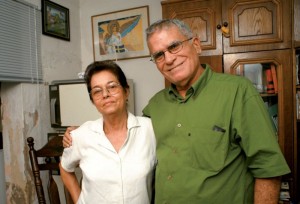
HAVANA, Cuba , September 2013, www.cubanet.org.- He was the most in love Cienfuegan I knew. He was called Oscar Manual Espinosa Chepe, although to most of the people who knew him he was simply “Chepe.” His Dulcinea, Miriam Leiva, was at his side over the last thirty years with a loyalty tested in the harsh conditions imposed by the Cuban dictatorship. Both were driven from their important positions, and later Chepe was condemned to twenty years in prison during the Black Spring.
I met him when he was in his sixties. He was already an accomplished economist. Friend of the truth, he had a small space on Radio Martí to talk about the island’s economy. He was published in Cubanet, Cartes de Cuba, Disidente and CubaEncuentro. He had written a couple of books, and his opinions and judgments were listened to by all analysts of the Antillean situation.
Soft-spoken, like an asthmatic, and unstoppable. Each one of his words and reflections vallued in gold. He never interrupted conversations and loved to tell stories of his trip to Yugoslavia as economic attaché to the Cuban embassy in Belgrade.
Born in an educated cradle in the Pearl of the South, his parents, Oscar and Clara, were degreed professionals and had a pharmacy frequented by the “good” people, who knew the quality and reliability of the service, and popular among the common people, because they knew they would find solidarity and help.
With these virtues in the home, he grew up knowing the potential of republican democracy and took advantage of it. Full of courage and patriotic enthusiasm, he joined the 26th of July Movement. For his actions, he was tried in Santa Clara and absolved by this “cordial republic,” that saw no danger in his ungovernability, and by the good offices of the then attorney and Commodore of the Cienfuegos Yacht Club, Osvaldo Dorticós Torrado, who later would become President of the Revolutionary Government.
The “Revolutionary dawn” found him immersed in the tasks of the “process.” Although he had visited Havana from a young age, he decided to settle in the great city due to a proposal from a fellow countryman to work in the recently created Ministry of Foreign Trade (MINCEX, 1961), an entity supposedly created to meet the needs of the Cuban state to assume the management and control of imports and exports. His knowledge and daring made him stand out, but at the same time they reprimanded him and sent him from his work at the Infanta and 23rd building to rough and complicated places, where he was meant to reform himself. It was in one of those places where he contracted an intestinal illness which marked his entire life.
On returning to his offices, after being “Revolutionarily re-educated,” Chepe revised his scale of values. He continued his economic studies and concentrated still more, and from his own perspective and vision, on the analysis of the national economy. For these efforts he was expelled from MINCEX in 1984, as stated in the act of the trial of the 75, and gradually he became a member of the pro-democratic groups and participated in the independent press as an economic analyst who was a reference point for everyone.
Chepe has died in Madrid, far from his beloved homeland. The generation that knew him will remember him forever. Rest in peace.
By Aleaga Pesant – aleagapesant@yahoo.es
From Cubanet
23 September 2013
